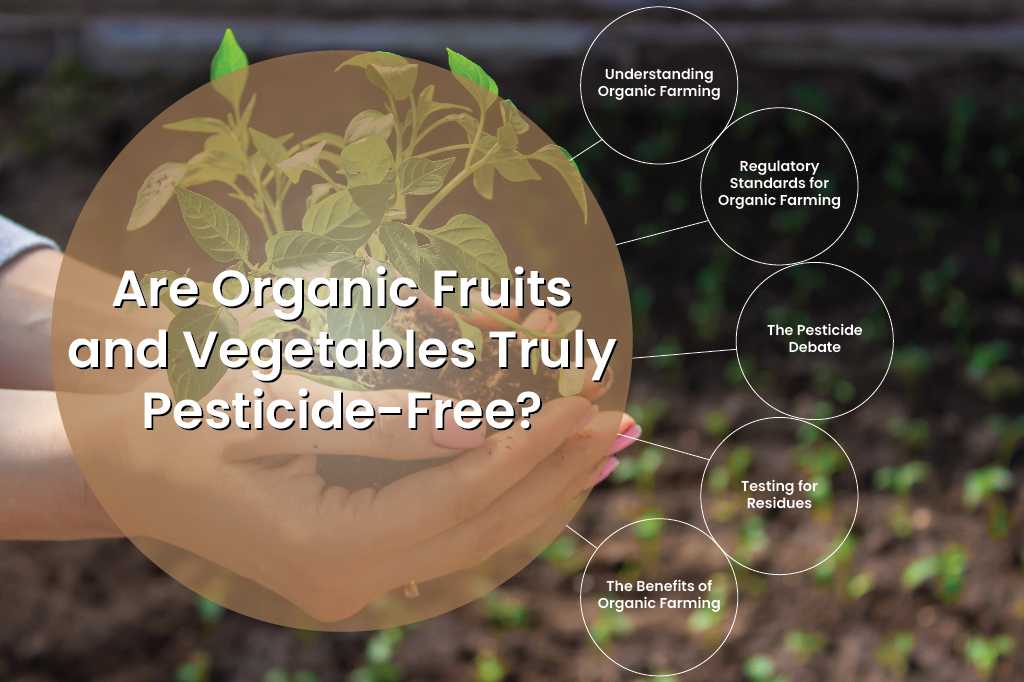
As consumers become increasingly health-conscious and environmentally aware, the demand for organic fruits and vegetables has skyrocketed. The allure of pesticide-free, chemical-free, and natural produce appeals to those seeking a healthier lifestyle and a safer food option for their families. However, a common question lingers: Are organic fruits and vegetables truly pesticide-free? Let’s delve into this topic and shed light on the truth behind organic farming practices. It is first important to understand the difference between organic and conventional farming in order to make an informed choice.
Understanding Organic Farming
When it comes to agriculture, two primary methods dominate the industry: organic farming and conventional farming. While both aim to produce food, they differ significantly in their approaches.
Organic farming is an agricultural system that emphasizes sustainability, biodiversity, and natural practices. Its core principles focus on promoting soil health, ecological balance, and the absence of synthetic chemicals, including synthetic pesticides and fertilizers. Instead, organic farmers rely on natural alternatives like compost, crop rotation, and integrated pest management to maintain the health and productivity of their crops.
The most fundamental distinction between organic and conventional farming lies in their farming practices. Conventional farming relies heavily on synthetic chemicals such as pesticides, herbicides, and fertilizers to enhance crop growth and protect against pests. On the other hand, organic farming like what we follow in Happy Harvest Farms and across all our partner farms, emphasizes the use of natural methods like crop rotation, composting, and biological pest control. By avoiding synthetic inputs, organic farming safeguards the soil reduces water pollution, and preserves biodiversity.
Regulatory Standards for Organic Farming
To ensure consistency and authenticity, organic farming is governed by strict regulations and certifications. To determine if your produce is truly organic, look for the certified organic label or logo. Organic produce is regulated by various certification bodies, depending on the region. These labels guarantee that the fruits and vegetables have been grown following strict organic farming practices, free from synthetic pesticides and fertilizers. Additionally, organic farms undergo regular inspections to ensure compliance with organic standards. By choosing produce with the certified-organic label, you can be confident that you are getting genuinely organic, healthier, and environmentally-friendly fruits and vegetables. At Happy Harvest Farms, we work only with certified-organic farms. All our farms undergo regular inspection checks and soil and water tests. All our produce is certified organic.
To be labelled as “organic,” farms must adhere to these guidelines, which prohibit the use of most synthetic pesticides and chemicals. Farms undergo regular inspections to validate their compliance with these standards and maintain their organic certification.
The Pesticide Debate
It is essential to acknowledge that “organic” does not necessarily mean “pesticide-free.” Organic farmers may use approved natural pesticides when necessary to protect their crops from pests and diseases.
Some of the eco-friendly measures used to catch pests include:
- Handpicking: Where pests like caterpillars are picked off one by one. Time-consuming, but effective!
- Introducing Beneficial Insects: Friendly predators like ladybugs or praying mantises are introduced to feed on pests like caterpillars
- Plant Traps: Decoy plants are used as plant traps to save our precious crops from being munched on by pests
- Natural sprays: Natural sprays using neem oil or garlic are used that are effective in repelling pests while preserving the farm’s health
These natural pesticides are generally less harmful to human health and the environment compared to synthetic chemicals. However, the use of such substances is carefully regulated, and their residues on produce are typically well within acceptable safety limits.
Testing for Residues
At Happy Harvest Farms, apart from working only with certified-organic farms and conducting regular soil and water tests, one of the things we also do is sensory testing for pesticides on all our produce as part of our stringent quality tests. Only if a product passes this test, do we include it in the day’s assortment.
The Benefits of Organic Farming
Organic farms prioritize the health of the soil and surrounding ecosystems, promoting biodiversity and natural balance. Organic farming practices also reduce the environmental impact, conserve water, and support wildlife habitats. Furthermore, organic fruits and vegetables are often praised for their enhanced flavour and nutrient content. Studies have shown that organic produce tends to have higher levels of vitamins, minerals, and beneficial compounds, making it a preferred choice for many health-conscious individuals. Organic farming remains a sustainable and eco-friendly alternative to conventional agriculture, offering consumers a safer and more nutritious option. When purchasing organic produce, consumers can feel confident that they are making a conscious choice for their health and the well-being of the planet.